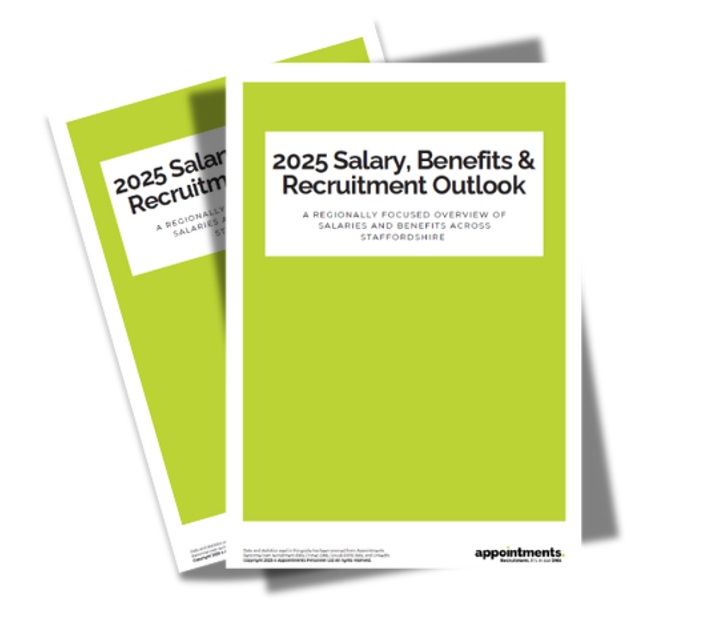
Share Article
Hiring the Right Candidate
Recruiting admin staff for your business is something you want to get right first time. Our top five tips will help you attract and select the top talent within Staffordshire and Cheshire.
Top Tips for Hiring the Right Admin Staff
Admin staff are the backbone of a company. They are the people who work behind the scenes to keep everything running smoothly so that businesses can function. In order for a business to succeed, it needs administrators who are organised, efficient and on top of their tasks. So, how do you make sure you hire the right person?
In this article, we share our 50+ combined years of experience recruiting office support staff in the Staffordshire and Cheshire area so you can hire with confidence.
Know what you need from your admin staff
This may sound obvious, but office support roles or administrative staff is a very wide arching term that can cover everything from answering telephones, filing, arranging meetings or travel to having input in accounts, managing supplies, dealing with customers and lots, lots more. So, before you start creating a job description or advertising, sit down and make a list of every task you require the candidate to undertake and the skills they’ll need to do each task. Once you have this, you can now start thinking about putting together a thorough and compelling job description.
Job descriptions should be concise and provide a detailed overview of the company and position. They should also include a clear outline of what is expected from the applicant as well as what benefits are being offered by the company. This will give applicants an idea about what they need to do in order to apply for your position, as well as answer questions they have before applying.
Pro Tip: If you want to find the perfect candidate for your job, include how you meet their expectations and highlight all the perks of working for you. This is particularly important in today’s tight recruitment market where there is so much competition to recruit the best talent.
Check out your competitors
If you want to attract the top talent in office support, then you need to understand what the approximate salary is for admin staff in the Cheshire, Staffordshire and Stoke-on-Trent. Some companies offer their admin staff more than their counterparts, but this does not mean that they are the best option for your business. There is no harm in conducting research into what other employers are offering their employees, but it is even more important that you assess whether or not what they are offering will suit your business. Our salary guides will give you a good ideas of what you should be offering to be competitive.
Pro Tip: If you’re not sure how to do this or you don’t have the time, please give us a call and our Office Support Specialist will be more than happy to help. They’ll point you to our salary guide which will give you a good ideas of what you should be offering to be competitive.
Ask the questions that matter
Whilst there is a wealth of information and research into the types of interview questions that can be asked to assess a candidate’s abilities, the best by far is competency, or situational based questions. Below are 5 examples of good competency-based questions you can use, however the best way of assessing suitability for your specific role is to take some of the most important tasks your role requires and adapt the questions below to suit those situations.
- Tell me about a time when you have had to deal with multiple tasks that require completion at the same time, and how you prioritised your work?
- Give me an example of a time when you have had to deal with a difficult customer. What did you do and what was the outcome?
- What documents have you created using Microsoft Office? What software did you use?
- How would you go about organising a monthly staff meeting?
- Tell me about a time you had to make a quick decision without being able to check with you manager. What did you do and what was the outcome?
Pro Tip: Did you know Appointments can help with interview training for hiring managers? Book onto one of our webinars now.
Use assessments to evaluate candidates
Assessments provide a practical and efficient way to evaluate potential admin staff. The assessment can be used to identify an applicant’s strengths and weaknesses, such as writing skills, typing skills or basic maths skills. It may also identify potential behavioural issues such as emotional intelligence or leadership capabilities. When creating assessments, think about the core areas you want to assess and how you want the ideal candidate to perform. Some core areas common in office support roles include communication, time management, teamwork, and technical ability.
Here are some examples of assessments you could use.
- Communication Roleplay – The interviewer plays the role of the persistent client in this scenario whilst the candidate plays the role of the administrator. The administrator’s manager, Gill, has asked the administrator to manage her phone calls for the day and ensure she is not disturbed. One of Gill’s clients calls and says that it is urgent. Assess how the candidate deals with the situation.
- Technical Assessment – This assessment can help evaluate the candidate’s skills of using Microsoft Office programmes. Ask the candidate to create a 3-slide presentation on a subject such as why they want the role, or a hobby they enjoy. The subject is unimportant in this assessment as you are looking at how well they use the software available. Give them a time limit to see how they respond to pressure.
- Time Management Assessment – A good example is an assessment, that involves lots of scenarios that are competing for their attention, for example the managing director is visiting with an important client in one hour and has asked you to prepare for the visit. The Sales Director has asked you to prepare his slides for a presentation this afternoon. Your manager has asked you to tidy up their report for the managing director. The presentation technology in the meeting room isn’t working and you’ve been asked to get it fixed. Ask them to writing down how they’d prioritise and why they’ve made that decision.
Pro Tip: Try to create or find assessments or scenarios that are closely related to your specific role
Never skip references
Whilst a thorough interview and assessment process gives you a great insight into a candidate’s skills and knowledge, you still can’t be 100% sure you have the right person for your office support role. This is why references from previous employers are essential. A reference from a previous employer ensures that the candidate has the skills and qualities needed to do well in the position at hand. It also provides proof that they are trustworthy and dependable, which is crucial for an administrative assistant position.
Pro Tip: Ensure you follow HR guidelines on what you can and can not ask as part of the referencing process.
Get help hiring admin staff
When it comes to hiring the best admin staff in the Cheshire and Staffordshire area our Office Support Specialist, Olivia, has you covered. Whether it’s for temporary, contract or permanent positions our unrivalled knowledge of the local candidate market makes us the best choice of recruitment partner. We can give you lots of support along the way. Contact Olivia now, call 01782 338787 or email olivia@appointmentspersonnel.co.uk










